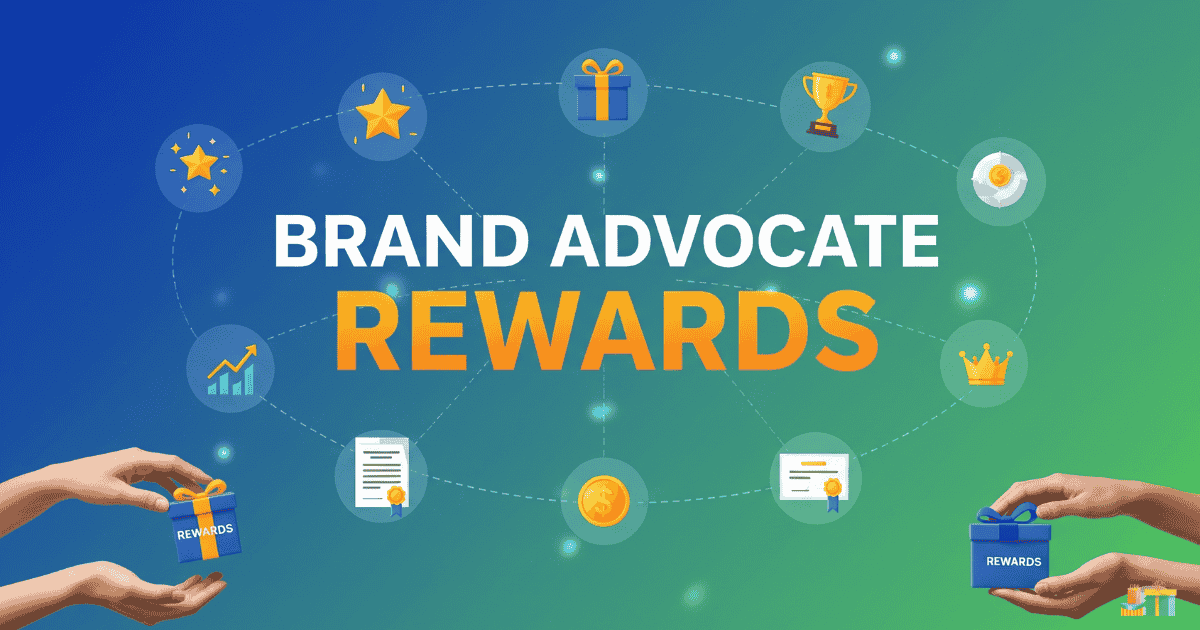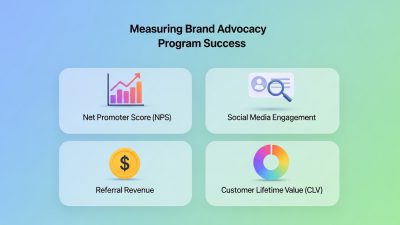Brand advocates are your most valuable marketing assets. These passionate customers don’t just buy from you—they actively promote your brand, defend you against criticism, and influence others to become customers. Yet many companies struggle to properly reward these loyal supporters beyond basic discounts or generic thank-you emails.
The challenge lies in creating rewards that feel genuine and meaningful rather than transactional. Generic rewards often fall flat because they fail to acknowledge the unique value that brand advocates bring to your business. When someone takes time out of their day to recommend your product to a friend or defend your brand on social media, they deserve recognition that matches their effort.
Effective brand advocate rewards go beyond simple monetary incentives. They create emotional connections, foster a sense of community, and make advocates feel truly valued for their contributions. The most successful programs combine tangible benefits with intangible experiences that money can’t buy.
This comprehensive guide explores innovative reward strategies that will energize your brand advocates and inspire even deeper loyalty. From exclusive experiences to gamification techniques, you’ll discover proven approaches that turn satisfied customers into lifelong brand champions.
Understanding What Motivates Brand Advocates
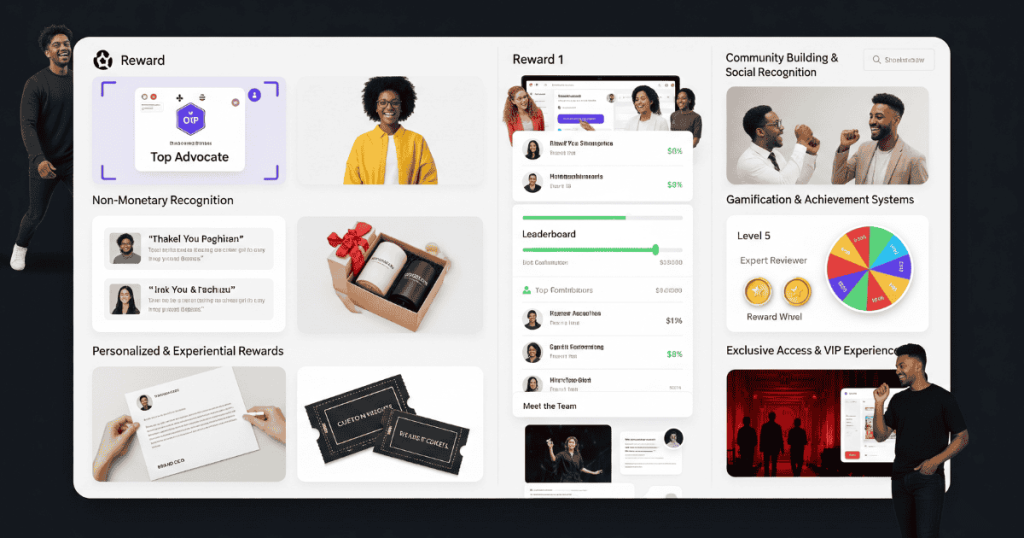
Before diving into specific reward ideas, it’s crucial to understand what drives brand advocates. Research shows that brand advocacy are motivated by more than just financial incentives. They seek recognition, exclusive access, and opportunities to feel like insiders within your brand community.
Brand advocates typically fall into several categories. Some are driven by status and prestige, wanting to be recognized as VIP customers. Others are motivated by community and connection, seeking relationships with like-minded people. Many advocates are drawn to exclusive access and behind-the-scenes content that makes them feel special.
Understanding these different motivations helps you design reward programs that resonate with various advocate personalities. A one-size-fits-all approach rarely works, but a diverse menu of rewards can appeal to different advocate types within your customer base.
The most effective brand advocate rewards create reciprocal value. While advocates receive benefits, they also gain opportunities to provide feedback, influence product development, or help shape brand direction. This two-way relationship transforms rewards from simple transactions into meaningful partnerships.
Exclusive Access and VIP Experiences
One of the most powerful categories of brand advocate rewards involves providing exclusive access that money can’t buy. These experiences make advocates feel like true insiders and create memorable moments that strengthen emotional connections to your brand.
Early product access ranks among the most coveted rewards for brand advocates. Allowing loyal customers to purchase or try new products before the general public makes them feel valued and special. This approach works particularly well for tech companies, fashion brands, and businesses with passionate customer bases who eagerly anticipate new releases.
Private shopping events create another layer of exclusivity that advocates appreciate. Whether hosted virtually or in physical locations, these events allow advocates to browse new collections, receive personal styling advice, or enjoy special discounts in an intimate setting. The social aspect of these events also helps build community among advocates.
Behind-the-scenes access satisfies advocates’ curiosity about how your business operates. This might include virtual factory tours, meetings with founders or key team members, or sneak peeks at upcoming campaigns. Content creators and influencers particularly value this type of access for their own content creation.
Executive interactions provide high-value touchpoints that advocates remember long-term. Arranging brief conversations with company leadership, whether through video calls, coffee chats, or exclusive Q&A sessions, demonstrates that you value advocate’ opinions and want to hear their insights directly.
Gamification and Achievement Systems
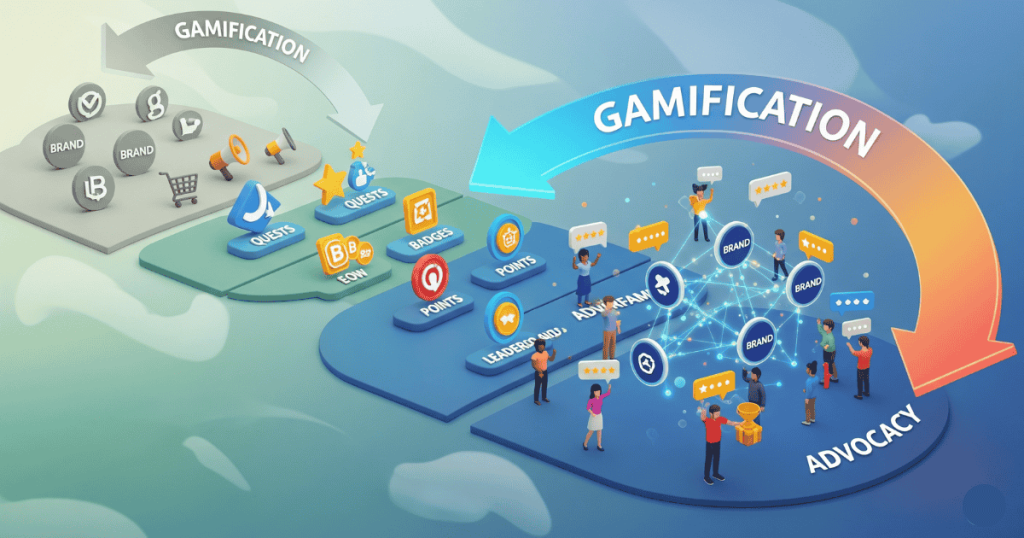
Gamification transforms brand advocacy into an engaging experience that taps into natural competitive instincts. Well-designed gamification systems create ongoing engagement while providing clear pathways for advocates to earn increasingly valuable rewards.
Point-based systems offer flexible frameworks for recognizing various advocate activities. Advocates might earn points for social media posts, referrals, product reviews, or community participation. The key is ensuring point values reflect the effort required and business value generated by different activities.
Achievement badges provide visual recognition for specific accomplishments. These digital credentials can acknowledge milestones like “First Referral,” “Social Media Superstar,” or “Community Helper.” Badges work especially well when they’re shareable on social media platforms, allowing advocates to display their status publicly.
Tiered membership programs create progression pathways that keep advocates engaged long-term. As advocates accumulate points or complete challenges, they unlock new reward tiers with increasingly exclusive benefits. This structure encourages continued participation and provides clear goals to work toward.
Leaderboards introduce friendly competition among advocates while celebrating top performers. Whether displayed publicly or shared in private communities, leaderboards recognize consistent contributors and motivate others to increase their participation. Regular leaderboard resets ensure newcomers have opportunities to achieve recognition.
Seasonal challenges keep gamification systems fresh and engaging. Special events tied to holidays, product launches, or company milestones create time-limited opportunities for advocates to earn bonus rewards or exclusive recognition.
Community Building and Social Recognition
Brand advocates often value community connection and social recognition as much as tangible rewards. Building strong communities around your brand creates environments where advocates can connect with each other while deepening their relationship with your company.
Private online communities give advocates exclusive spaces to interact with fellow customers and brand representatives. These communities might exist on dedicated platforms, private Facebook groups, or custom-built forums. The exclusivity factor makes membership feel valuable while creating opportunities for organic advocacy.
User-generated content campaigns harness advocates’ creativity while providing social recognition. Contests encouraging advocates to create content featuring your products can generate authentic marketing materials while giving participants opportunities to be featured on official brand channels. Recognition through official brand social media accounts provides valuable social proof for advocates.
Advocate spotlights celebrate individual customers through feature stories, interviews, or social media posts. These profiles showcase how advocates use your products, why they love your brand, and what makes them special. Personal recognition often means more to advocates than monetary rewards.
Community events bring online relationships into real-world settings. Whether through local meetups, national conferences, or virtual gatherings, these events strengthen bonds between advocates and create memorable shared experiences. Events also provide opportunities for advocates to provide feedback and influence brand direction.
Collaborative projects invite advocates to contribute directly to brand initiatives. This might involve beta testing new products, participating in design feedback sessions, or helping create educational content. The collaborative aspect makes advocates feel like true partners rather than just customers.
Dig Deeper: How to Find Brand Advocates in Your Customer Base?
Personalized and Experiential Rewards
Personalization transforms standard rewards into meaningful gestures that demonstrate genuine appreciation for individual advocates. The most memorable rewards acknowledge advocates’ specific preferences, interests, and contributions to your brand.
Custom product creation offers ultimate personalization for dedicated advocates. This might involve personalized engravings, custom color combinations, or products featuring advocates’ names or photos. While more expensive than standard rewards, custom products create lasting reminders of the advocate’s special relationship with your brand.
Experience packages provide memories that last far beyond tangible products. These might include concert tickets, sporting event access, spa days, or adventure experiences. The key is matching experiences to advocate interests and preferences rather than assuming one experience appeals to everyone.
Skill development opportunities show investment in advocates’ personal growth. This could include free courses, workshop access, certification programs, or mentorship opportunities. Professional development rewards particularly appeal to B2B advocates who value career advancement.
Surprise and delight moments create positive emotions that strengthen brand loyalty. Unexpected gifts, handwritten notes, or spontaneous experiences show advocates that you’re thinking about them beyond formal reward programs. The unpredictable nature of these gestures often makes them more memorable than scheduled rewards.
Charitable contributions made in advocates’ names align reward programs with values-driven customers. This approach works especially well for brands with strong social responsibility commitments and advocates who care about making positive impacts beyond personal benefits.
Non-Monetary Recognition Programs
Not all effective brand advocate rewards require significant financial investment. Some of the most meaningful recognition programs focus on acknowledgment, status, and social proof rather than expensive gifts or experiences.
Public acknowledgment through official brand channels provides valuable social recognition. This might include featuring advocates in newsletters, highlighting them on company websites, or showcasing their content on official social media accounts. The public nature of recognition often holds more value than private rewards.
Advisory board positions give select advocates meaningful input into brand decisions. Even if advisory roles are largely ceremonial, the title and occasional consultation requests make advocates feel valued and connected to brand strategy. This approach works particularly well for B2B companies with engaged customer communities.
Certification programs create official credentials that advocates can display professionally. These programs might involve training modules, assessments, and official certificates that acknowledge expertise with your products or services. Certified advocates often become more effective promoters because they possess deeper product knowledge.
Early feedback opportunities invite advocates to influence product development before features reach the broader market. Beta testing programs, focus groups, and feedback surveys give advocates a voice in brand evolution while making them feel like insiders with special access to company decision-making.
Content collaboration projects position advocates as thought leaders within your industry. Co-authoring blog posts, participating in webinars, or contributing to white papers provides professional recognition while creating valuable marketing content. These collaborations often generate more authentic content than purely internal efforts.
Implementation Strategies for Reward Programs
Creating successful brand advocate reward programs requires careful planning, clear communication, and ongoing optimization. The most effective programs start small, gather feedback, and evolve based on advocate response and program performance.
Program structure should align with your business model, customer base, and available resources. Simple programs with clear rules often perform better than complex systems that confuse participants. Start with basic reward categories and add complexity only after establishing program foundations.
Communication strategy plays a crucial role in program success. Advocates need to understand how to participate, what rewards are available, and how their contributions are valued. Regular updates about program changes, new rewards, or recipient recognition help maintain engagement and enthusiasm.
Technology platforms can streamline program administration and improve the advocate experience. Various software solutions exist for managing point systems, tracking participation, and distributing rewards. Choose platforms that integrate with your existing marketing technology stack and provide good user experiences for both advocates and administrators.
Budget allocation should balance reward costs with program administration and technology expenses. While expensive rewards might seem more appealing, consistent recognition through smaller rewards often drives better long-term engagement than sporadic high-value prizes.
Performance measurement helps optimize program effectiveness over time. Track metrics like participation rates, advocate lifetime value, referral generation, and program satisfaction scores. Regular analysis identifies successful reward types and areas for improvement.
Measuring Success and ROI
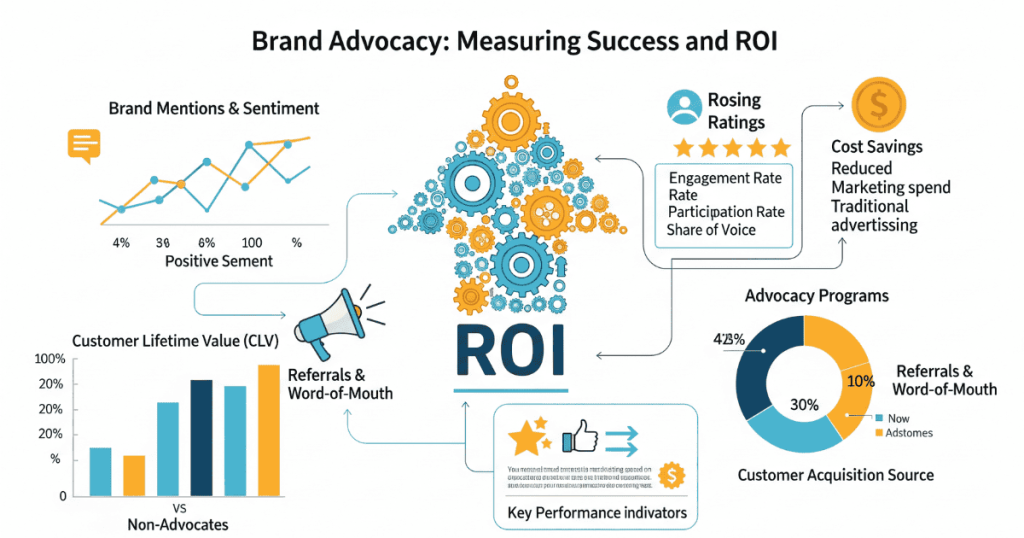
Effective brand advocate reward programs require ongoing measurement to justify investment and guide optimization efforts. The most successful programs track both quantitative metrics and qualitative feedback to understand true program impact.
Participation metrics provide baseline program performance indicators. Track how many advocates engage with different reward opportunities, which rewards generate the most interest, and how participation rates change over time. Declining participation might signal a need for program refreshment or communication improvements.
Business impact measurements connect advocate activities to concrete business outcomes. Monitor referral rates, social media mentions, user-generated content creation, and customer lifetime value changes among program participants. These metrics demonstrate program ROI and justify continued investment.
Advocate satisfaction surveys gather qualitative feedback about program effectiveness and reward preferences. Regular surveys help identify which rewards advocates value most, what program changes they’d like to see, and how the program affects their brand loyalty. This feedback guides program evolution and ensures continued relevance.
Retention analysis compares advocate loyalty before and after program participation. Advocates who feel valued through reward programs typically demonstrate higher retention rates, increased purchase frequency, and greater lifetime value. These improvements often justify program costs even before considering advocacy benefits.
Competitive analysis helps benchmark your program against industry standards and identify differentiation opportunities. Understanding how competitors reward their advocates can reveal gaps in your program while highlighting unique strengths that set your approach apart.
Building Long-Term Advocate Relationships
The most successful brand advocate reward programs focus on building lasting relationships rather than driving short-term activities. Long-term thinking creates sustainable advocacy that continues generating value for years rather than months.
Relationship evolution acknowledges that advocates’ needs and interests change over time. Programs should offer diverse reward options that remain relevant as advocates’ lives and priorities shift. Regular program updates ensure continued appeal to both new and long-term participants.
Feedback integration demonstrates that advocate input influences program development. When advocates suggest improvements or new reward ideas, implementing viable suggestions shows that their opinions matter. This responsiveness strengthens advocate investment in program success.
Recognition consistency ensures that advocates feel valued throughout their relationship with your brand. Sporadic recognition programs often fail because advocates lose interest during quiet periods. Consistent appreciation maintains engagement and demonstrates ongoing commitment to advocate relationships.
Community growth strategies help expand advocate networks while maintaining program quality. As programs mature, focus on helping existing advocates recruit new participants while ensuring that rapid growth doesn’t dilute the exclusive feel that makes programs attractive.
Program evolution requires balancing stability with innovation. While advocates appreciate consistent program elements they can rely on, programs also need fresh rewards and experiences to maintain long-term interest. Regular program updates should add new options while preserving core elements that advocates value most.
Taking Your Brand Advocacy Program Forward
Creating effective brand advocate rewards requires understanding your customers’ motivations, designing diverse reward options, and maintaining consistent appreciation for their contributions. The most successful programs combine exclusive access, gamification elements, community building, and personalized recognition to create comprehensive advocate experiences.
Remember that the best rewards often provide value beyond their monetary cost through exclusivity, social recognition, and emotional connection. Start with simple reward structures and evolve your program based on advocate feedback and participation patterns. Focus on building genuine relationships rather than transactional exchanges.
Success in brand advocacy rewards comes from consistent execution, regular program evaluation, and ongoing commitment to advocate satisfaction. When advocates feel truly valued for their contributions, they become even more passionate promoters who drive sustainable business growth through authentic recommendations and continued loyalty.
FAQs
1. What motivates customers to become brand advocates?
Customers become brand advocates when they feel a strong emotional connection to a brand. Key motivators include personalized recognition, exclusive access, VIP treatment, community belonging, and feeling valued for their opinions. When brands reward advocates with meaningful experiences—not just discounts—advocacy naturally increases.
2. What are the best rewards to offer brand advocates?
The best advocate rewards are those that create emotional value, such as early product access, VIP events, behind-the-scenes experiences, personalized gifts, gamified achievements, and public recognition. Non-monetary rewards like advisory roles, spotlight features, and certification badges also work extremely well.
3. How do you identify true brand advocates?
True advocates can be identified through social listening tools, referral data, repeat purchase behavior, engagement analytics, user-generated content, and sentiment analysis. AI-powered platforms like Brandwatch, Sprout Social, and HypeAuditor can detect highly engaged customers who consistently promote your brand.
4. How can gamification improve brand advocacy programs?
Gamification increases participation by making advocacy fun and rewarding. Point systems, badges, levels, challenges, and leaderboards keep customers engaged and motivated. It creates ongoing excitement, boosts user activity, and encourages healthy competition among advocates.
5. What is the difference between brand advocates and influencers?
Brand advocates are unpaid, loyal customers who genuinely promote your brand because they love it. Influencers, on the other hand, are paid or incentivized content creators with large followings. Advocates offer authenticity, while influencers offer scale. The strongest strategies combine both.


